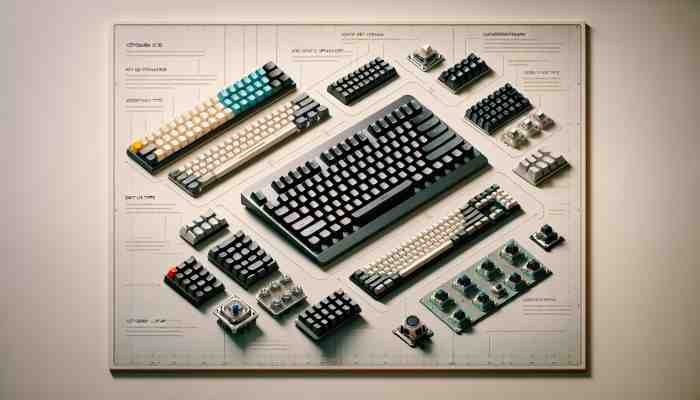# 5 Key Factors for Choosing Your Ideal Keyboard
Choosing the right keyboard is not just about tapping into the latest tech or splurging on the fanciest gadget. It’s about fine-tuning your typing experience, bolstering your Words Per Minute (WPM), and ensuring your fingers feel like they're dancing rather than dragging. Whether you're a copywriter, a coding ninja, a competitive type test champion, or just someone keen on improving your daily typing stats, picking the right keyboard can elevate your typing efficiency to new heights. Let’s unpack the essential factors that you need to consider when shopping for your typing companion, ensuring every keystroke counts.
# 1. Key Switch Type
One of the most crucial aspects to consider when selecting a keyboard is the type of key switches it uses. These are primarily of three types: mechanical, membrane, and scissor switches. Mechanical keyboards, known for their satisfying click and clack and high responsiveness, can significantly improve typing speed and accuracy, making them a favorite in the type test circles. Membrane keyboards, while quieter and usually more affordable, often lack the tactile feedback that speed typists desire. Scissor switches offer a middle ground with a quieter experience than mechanical switches but with more tactile feedback than membranes. Your choice should hinge on your preference for speed versus sound, resilience versus responsiveness.
# 2. Key Layout and Size
The layout of the keys can be a game-changer, especially if your work involves specialized key functions. Whether it’s a traditional QWERTY keyboard or an ergonomic split design, the layout should complement your typing style and necessities. Remember, a poor layout can slow you down and even strain your wrists. Full-sized keyboards come highly recommended for users who rely heavily on numeric pads. Conversely, minimalists or those constrained by compact spaces might lean towards a tenkeyless design (without the number pad).
# 3. Build Quality and Design
Durability often trumps aesthetics, but who says you can't have both? If you're a heavy typer, look for keyboards designed with high-quality materials capable of enduring millions of keystrokes. Keyboards with metal or sturdy plastic frames are typically more durable. Additionally, the overall design – from the angle of incline to the spacing between the keys – can significantly affect your typing speed and comfort during prolonged typing sessions.
# 4. Connectivity Options
Are you tangled in wires, or is the wireless world calling your name? Both wired and wireless keyboards have their merits. Wired keyboards, typically USB-connected, offer reliability and a non-dependent use on batteries, which is essential during unending typing marathons. Wireless keyboards tidy your space and offer flexibility but remember to check the battery life. Bluetooth keyboards especially favor those who switch typing across different devices, say from a computer to a tablet.
# 5. Additional Features
Lastly, do not overlook additional features that might streamline your typing process or just make it more enjoyable. Backlit keys are a godsend for low-light environments, programmable keys can automate repetitive tasks, and USB pass-through can be quite handy for connecting additional devices. Even things as humdrum as the texture of the keys can affect your typing experience.
When you choose a keyboard, try to balance these considerations with your personal needs and type test ambitions. A well-chosen keyboard is not just a tool; it’s a gateway to maximizing your typing efficiency, whether you’re knocking out an epic novel, coding software, or testing your WPM for bragging rights on TypeTest.io.
Remember, at TypeTest.io, it’s not just about how fast you type but how comfortably and effectively you do it. So why not choose a keyboard that elevates your typing prowess to meet your ambitions head-on? Happy typing, and may your new keyboard be your best companion in your quest for typing superiority!
